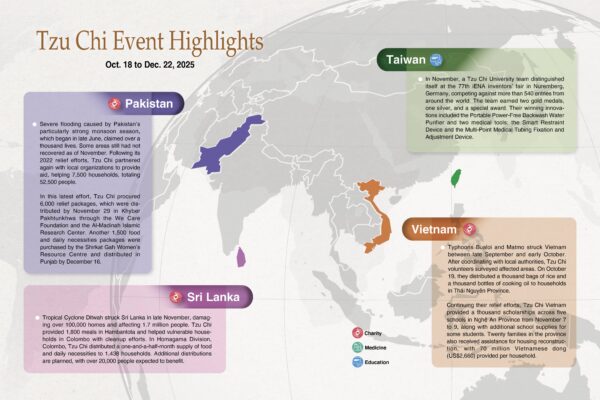Compiled by Huang Xiao-qian
Edited and translated by Wu Hsiao-ting
Photos courtesy of Tzu Chi Indonesia
In 1992, Liu Su-mei (劉素美) and her family emigrated from Taiwan to Indonesia, where her husband was setting up a factory. She met a group of Taiwanese businessmen’s wives there, and together they started volunteering for Tzu Chi. The first Tzu Chi office in Indonesia was located in Liu’s home. From that humble beginning, Tzu Chi Indonesia has since expanded across the country, with chapters in 18 cities. Their work encompasses the four Tzu Chi missions of charity, medicine, education, and culture. In this article, Liu—now the CEO of Tzu Chi Indonesia—reflects on her Tzu Chi Path during a question-and-answer session with senior volunteer Jia Wen-yu (賈文玉).
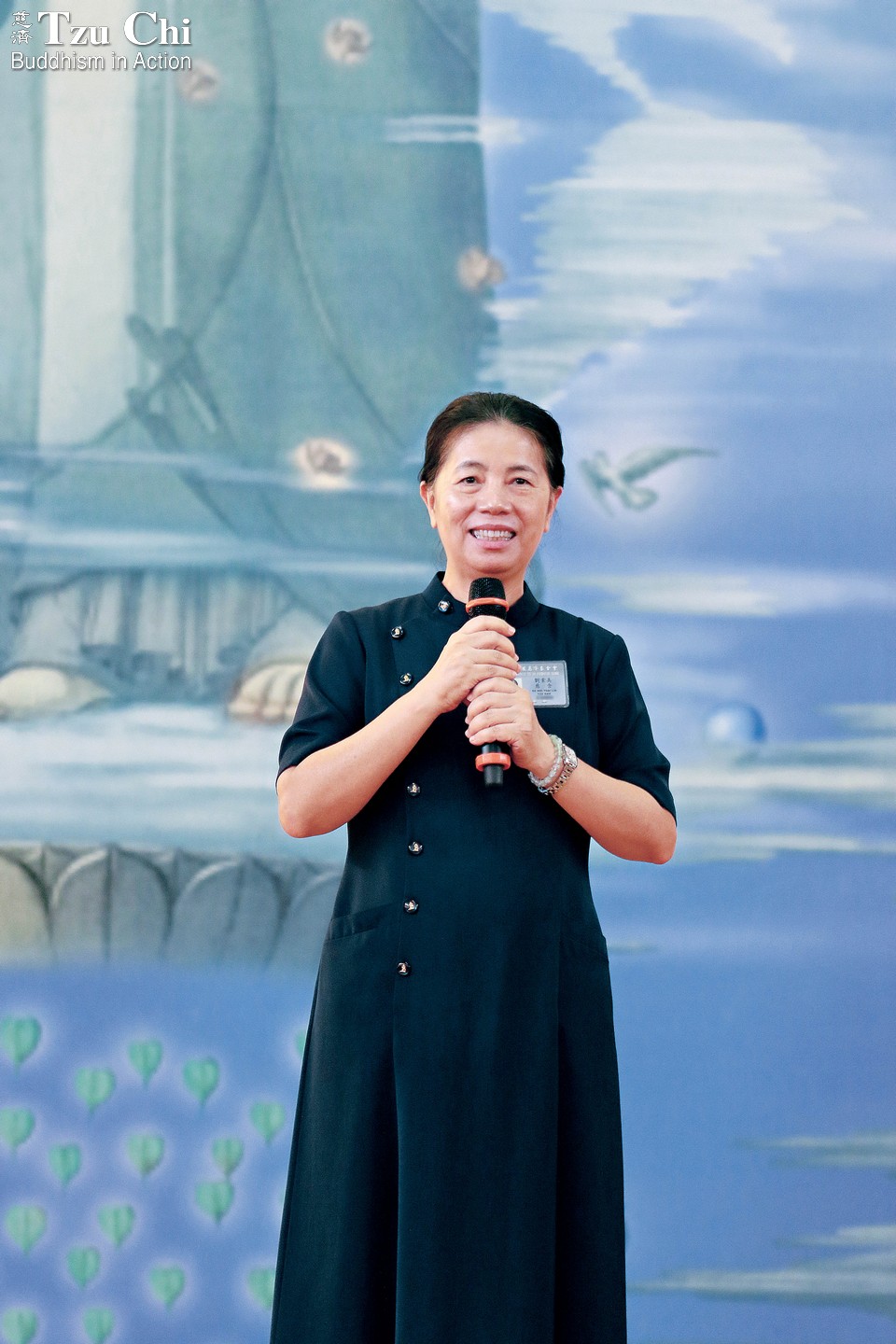
Many of the Tzu Chi volunteers in Indonesia know you are busy every day, that you are very hard-working, walk fast, and are constantly in meetings. But we don’t know you very well, even though we all live in the same country. Could you share with us first how you came to join Tzu Chi?
I was born into a middle-class family in Taiwan to parents who didn’t mind hard work and who lived frugally. Being fond of giving and doing good, they taught us as we grew up to help others and do good deeds, no matter how small.
After I had moved to Indonesia with my husband and children, Sister Liang Qiong (梁瓊) introduced Tzu Chi to me. She was also from Taiwan. I met her at the school my children were attending in Jakarta. That was back in the 1990s, and I knew many Indonesians were struggling to get by, so that’s when I started donating money to help local people in need.
At the time, many Taiwanese wives would, like me, accompany their children to the school. After they had dropped their kids off, they’d wait around until it was time to take their children home. Since they didn’t have anywhere to go in the meantime, and my home was near the school, I’d invite them to my home to rest. Gradually more and more people began showing up. It was during this time that Liang began taking us to visit nursing homes and orphanages. We also packed items to be given to the needy at my home. That’s how the very first Tzu Chi office in Indonesia came to be located in my home.
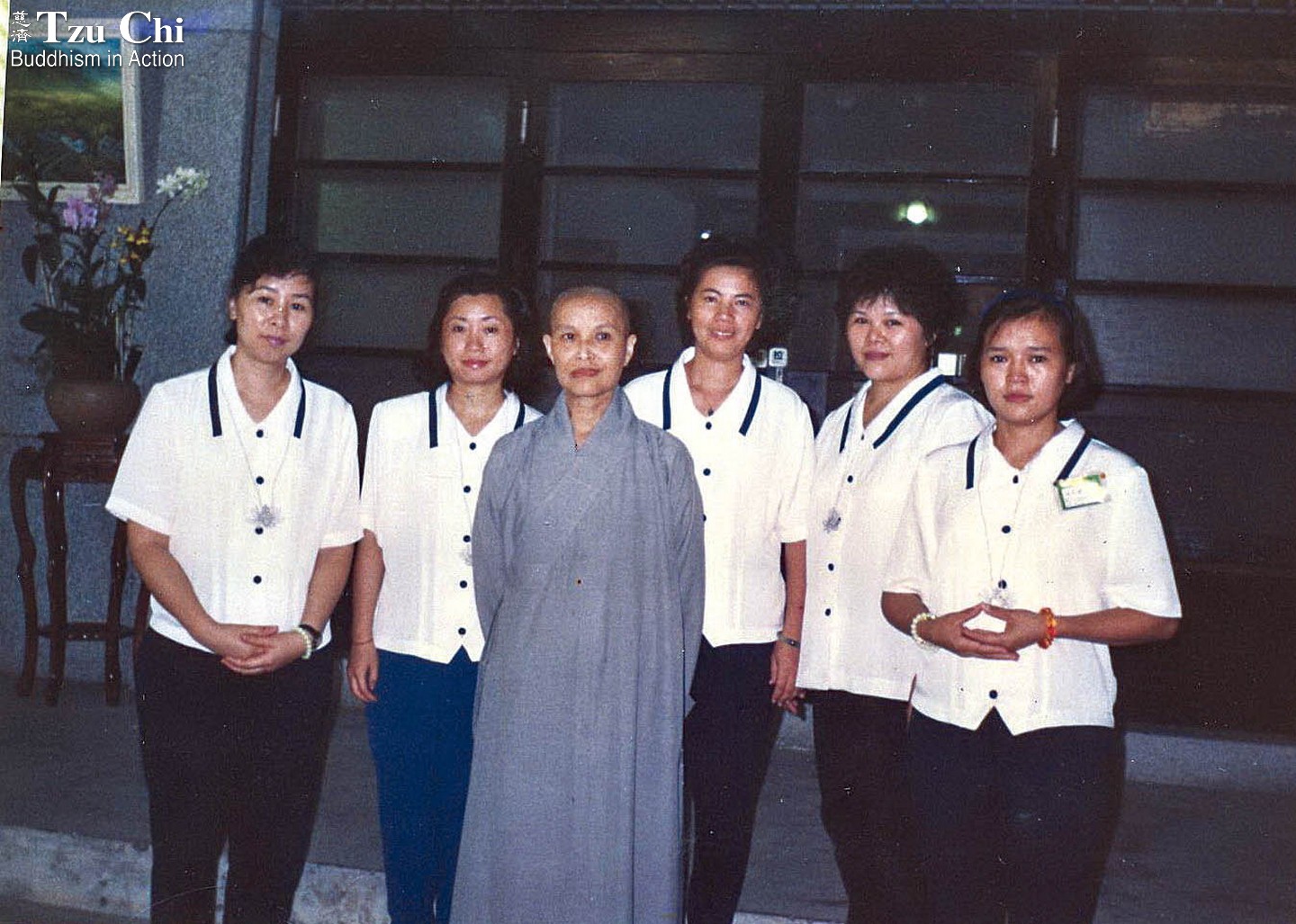
Liu Su-mei (third from right) and five other wives of Taiwanese businessmen in Indonesia visited Master Cheng Yen at the Jing Si Abode in Hualien, eastern Taiwan, in 1993. That was the first time Liu met the Master, who would become her mentor for life. Courtesy of Liu Su-mei
How did Tzu Chi Indonesia start?
Tzu Chi Indonesia started by helping needy households. Liang was our leader until she moved back to Taiwan with her family. Since the Tzu Chi office was located in my home by that time, everyone hoped that I could take her position. So, that’s what I did.
Even though we were volunteering for Tzu Chi, our knowledge of the foundation was very limited—all we knew was that its founder was in Hualien, Taiwan. I thought that since we had decided to do philanthropic work in Indonesia under the banner of Tzu Chi, we should get a better understanding of the foundation. So, in 1993, five other Taiwanese women and I visited Tzu Chi headquarters—the Jing Si Abode—in Hualien.
We were really naive and innocent back then. We didn’t even know that we should have made an appointment first, and just showed up! It had occurred to us to dress properly, so we had bought identical white blouses and identical pairs of blue pants and wore them, but as it turned out, the colors of our clothes were the exact opposite of those of the blue-shirt-and-white-pants uniforms worn by Tzu Chi volunteers. When we arrived at the Abode, a nun there asked us where we were from. We told her we were from Indonesia and that the purpose of our visit was to learn how to carry out Tzu Chi work in the country. Even though we had shown up unannounced, we were received very graciously.
When we went back to Indonesia, we continued our work of helping the needy. When we learned of people having difficulty getting by, we assessed their needs and provided financial aid. When someone was sick and couldn’t afford the medical bill, we’d help them out too. The language barrier was still a problem for us at the time, but we overcame it by asking people to interpret for us. When we needed guidance, we’d phone the Jing Si Abode for help.
Gradually, we gained a better understanding of Tzu Chi’s guiding principles for giving aid. We also came to better realize what Master Cheng Yen meant when she taught us to learn and grow through the work we do. I had joined Tzu Chi because I wanted to do charity work, but imperceptibly an inner transformation began taking place in me. I became more grateful for everything, and learned to give without expecting anything in return. Though I didn’t plan it, Master Cheng Yen was my very first Buddhist master and would become my mentor for life.
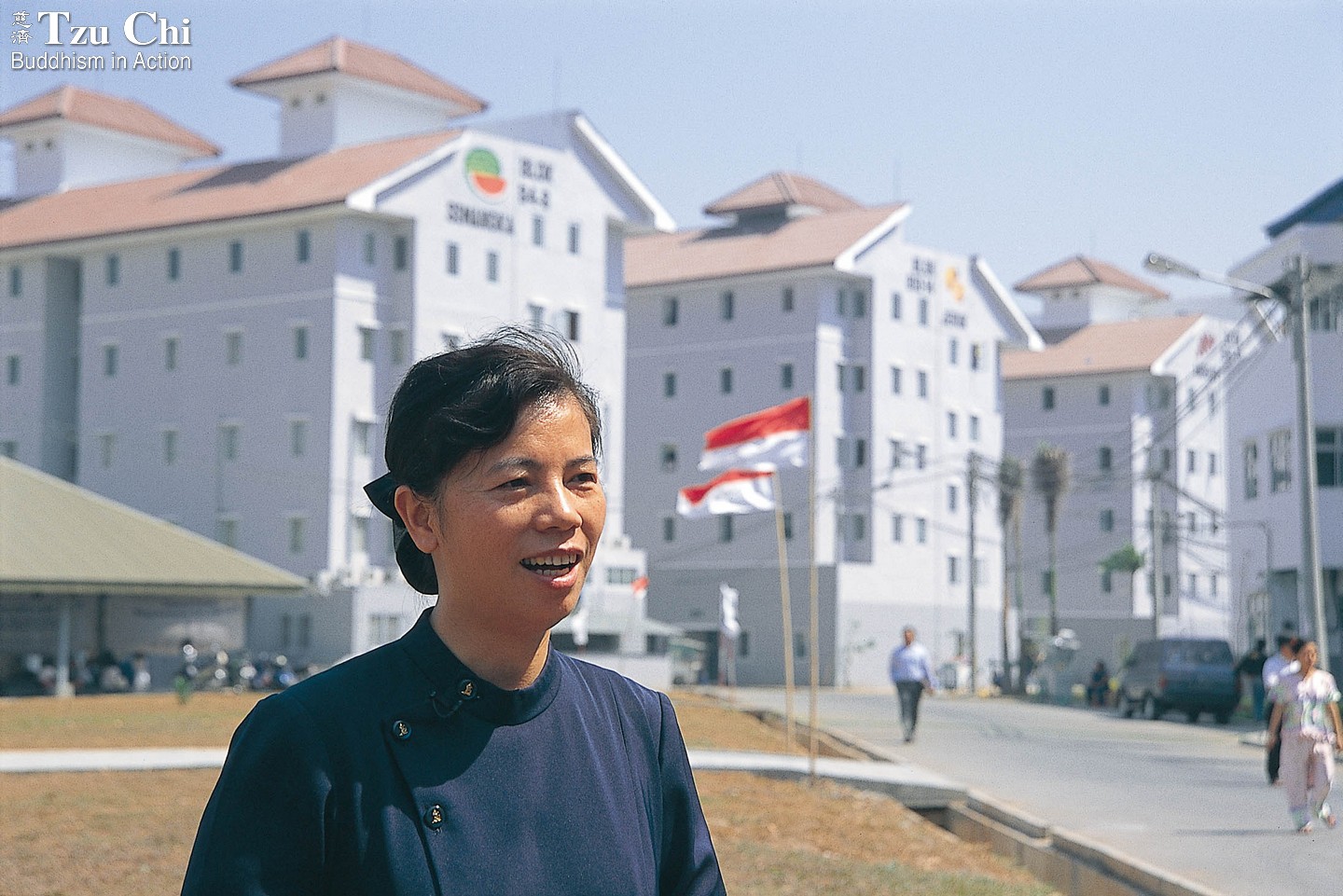
Liu Su-mei has volunteered for Tzu Chi in Indonesia for 28 years. This picture was taken in 2003 when a housing village the foundation built for people who had previously lived in illegally built houses on the banks of the Angke River was first inaugurated. In the background of the picture is the newly completed village, located in Cengkareng, West Jakarta. Yan Lin-zhao
Mount Merapi in Yogyakarta, Indonesia, erupted at the end of November 1994. It led to the first large-scale relief operation Tzu Chi volunteers in Indonesia organized. Could you relate how you went about the work at that time?
More than 5,000 people were evacuated that time. Our group of Taiwanese wives, disregarding the language barrier and any possible danger, decided to do something to help. We succeeded in getting a lot of people to donate relief goods. We were concerned the goods would be stolen as they were being delivered to Yogyakarta, so we used a 40-foot cargo container to transport the items. We estimated the arrival time of the container in Yogyakarta and then flew over there in advance to wait for it.
When we arrived, however, we couldn’t find the cargo container. It turned out that the mountain roads there were too narrow to accommodate the delivery vehicle. There were no cell phones back then, so we had to hit the roads to physically look for the container. We looked all over. Following some fallen tree branches along a road, we eventually found the container. We then got a truck to transport the relief goods to the disaster area.
We also visited hospitalized survivors at the time to distribute consolation cash. We saw during such visits how people who had been burned by the lava or fumes wailed with pain. That was the first time in our lives we realized what a “living hell” meant.
I made seven more visits to the disaster area after that and learned in the process that local residents were being relocated to safer regions where they would need new houses. We helped meet the need by raising enough money to build 12 houses. We gave the money we had raised to the social welfare department in Yogyakarta in 1995. That marked the first time Tzu Chi donated money to build houses for the needy in Indonesia.
Soon afterwards, you began providing free clinics for the needy. What led you to carry out medical work in Indonesia?
Back then, many children in impoverished rural areas suffered from malnutrition. Tuberculosis was common among local populations too. These children and patients needed long-term medical aid and nutritional support. In 1995, Tzu Chi launched a project to help address these issues, in cooperation with the health bureaus in Tangerang and Serang, both in the province of Banten. Three villages were included in our project. We held monthly free clinics, providing medicine, powdered milk, and rice. Our efforts eventually enabled 88 percent of patients included in our project to recover.
In 1998, social and ethnic violence among Indonesians and Chinese erupted in Indonesia, seriously impacting the economy. We distributed more than 100,000 packages of rice and other items in the aftermath to help the poor. The following year, we conducted a large-scale free clinic—our first large-scale free clinic in Indonesia. We provided treatments in surgery, dentistry, ophthalmology, and internal medicine, serving 9,523 patients in three days. Among these, 604 people had surgery.
We didn’t have any experience in holding such a large medical event at the time, and we lacked the needed medical equipment. If it weren’t for the help of healthcare professionals in Indonesia and members of the Tzu Chi International Medical Association (TIMA) from Taiwan, the Philippines, and Singapore, we couldn’t have pulled off such a large event. Tzu Chi medical volunteers from outside Indonesia helped in that free clinic, and continued to visit for large-scale free clinics after that. They eventually inspired health workers in Indonesia to form a local TIMA chapter.
In 2003, we established a free clinic center in a Tzu Chi housing village in Cengkareng, West Jakarta. The free clinic center was later upgraded to a hospital, becoming what is now Tzu Chi Great Love Hospital. Our newest hospital, Indonesia Tzu Chi Hospital, has started a trial operation this year too.
Tzu Chi Indonesia distributed more than 446,000 packages of daily necessities to families impacted by the COVID-19 pandemic in 2020. The branch worked twice more with local businesspeople in January and July this year to raise donations to help the underserved. After receiving ten kilograms (22 pounds) of rice and 20 face masks from Tzu Chi, an older woman said, “Thank you, Allah. Thank you, Tzu Chi volunteers. We don’t have much rice left at home.”
The turning point for Tzu Chi Indonesia came when two deputy CEOs joined. Could you share about this?
Brother Franky Oesman Widjaja (黃榮年) joined in 1998, and Brother Sugianto Kusuma (郭再源) followed in 2002. Their joining meant a lot for the development of Tzu Chi Indonesia and was the reason why we could make such a big difference in the country. We have Mr. Eka Tjipta Widjaja (黃弈聰), the founder of the Sinar Mas Group in Indonesia, and you, sister Wen-yu, to thank for their joining. [Sister Wen-yu introduced Eka Tjipta Widjaja to Tzu Chi.]
Mr. Widjaja was the father of Brother Franky, who became Master Cheng Yen’s lay disciple on May 9, 1998, when he accompanied his father on a visit to the Master in Taiwan. In the aftermath of the May 1998 riots in Indonesia that I mentioned before, Mr. Widjaja instructed Brother Franky to lead their employees at the Sinar Mas Group to help Tzu Chi distribute 100,000 packages of daily necessities to the needy. Tzu Chi Indonesia wasn’t as big at the time, and we couldn’t have accomplished that massive mission without their support.
Brother Franky had just become the Master’s disciple at the time, but he stepped up to the plate and did his very best. I’ve since learned so much from him. He has a broad, pure mind, and is very humble and approachable. He exemplifies qualities of a great leader. He often says, “If there is work no one wants to do, I’ll do it. And I’ll always fully support those who step up to the plate.”
Back in the day when Tzu Chi Indonesia was quickly growing and needed manpower, Brother Franky came in with a lot of support, including letting his high-ranking employees at the Sinar Mas Group go so that they could join and work for Tzu Chi. It might be easy for big-time business owners to donate money, but it is another matter when it comes to parting with their important executives. This just goes to show how much Brother Franky loves the Master and Tzu Chi.
That brings me to Brother Sugianto, whom we nicknamed “Brother No Problem.” He has a strong sense of fairness and justice and is as good as his word. He is also decisive and efficient.
At the request of Mr. Widjaja, Brother Sugianto joined Brother Franky and me in carrying out relief work for Tzu Chi after Jakarta was hit by severe flooding in 2002. As soon as he joined Tzu Chi, he began introducing entrepreneurs to the foundation. Aided by donations from the business sector, we built two housing villages for flood victims who had previously lived in illegally built houses along the banks of the Angke River. We built three more housing villages for people made homeless by the catastrophic 2004 Indian Ocean tsunami. From 2003 to 2005, working with Chinese businesspeople, we distributed rice to 2.5 million needy households. During that period, we also inaugurated one branch office after another across Indonesia, 15 in all. In 2005, our TV station, DAAI TV Indonesia, began operation. In 2008, we started a project to build a Tzu Chi complex in Jakarta to accommodate facilities for our four missions: a Jing Si Hall, an international school, and the soon to be inaugurated Tzu Chi Hospital. Through the work we have done in Indonesia, we have contributed to harmony among people of different races and religious faiths in our society. We have allowed Buddhism to win a lot of respect and affirmation in Indonesia.
I’m immensely grateful to Brothers Franky and Sugianto for using their business connections to encourage philanthropy among their fellow businesspeople. They’ve had a positive impact on society. The two are like real brothers related by blood. They respect and trust each other; they accommodate and complement each other. They revere Master Cheng Yen, have implicit faith in her, and live out her teachings. Many entrepreneurs in Indonesia have learned from their example, following in their footsteps to join Tzu Chi.
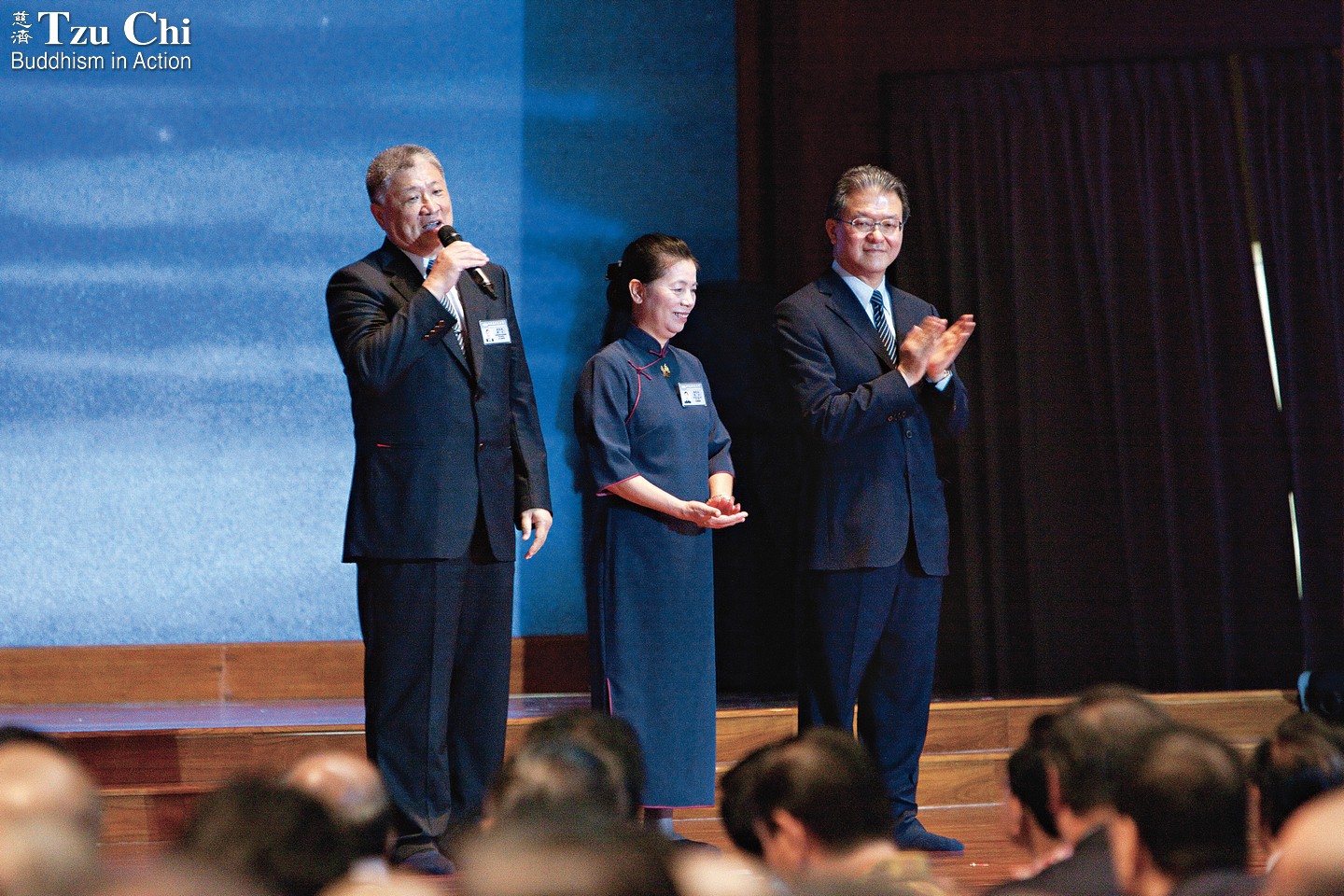
The Jing Si Hall where Tzu Chi Indonesia is located was inaugurated in October 2012. CEO Liu Su-mei (middle) and deputy CEOs Franky Oesman Widjaja (right) and Sugianto Kusuma went onstage to express their gratitude for everyone who had contributed to Tzu Chi.
Could you share your thoughts about carrying out the four Tzu Chi missions in Indonesia?
Tzu Chi, founded by the Master, has four missions: charity, medicine, education, and culture. Breaking ground in 2008 for the Tzu Chi complex in Jakarta signified a milestone in our efforts to advance our four missions in Indonesia. The complex became home for a Jing Si Hall, DAAI TV Indonesia, an international school, and a hospital to help safeguard life.
Many volunteers in Indonesia, myself included, are not professionals in the work we do. Challenges along the way have been inevitable. But as we strove to overcome the challenges, we came to realize more deeply the hardships the Master must have experienced as she worked to build Tzu Chi from scratch. No matter the obstacles she faced, she steadfastly stuck to her path. We have taken courage from her indomitable spirit.
Charity work is the root of all Tzu Chi missions. We started by doing charity work too, with which we laid a firm foundation for Tzu Chi Indonesia. We have become what we are today by inspiring many people to join us. I’m thankful for the mindfulness and hard work of all our volunteers. Without them, we couldn’t have successfully built up our four missions. I’m also full of gratitude for the good karmic affinities that led a group of entrepreneurs to join us. They are all devoted disciples of Master Cheng Yen. They have contributed their respective specialties to Tzu Chi, have given of themselves selflessly, and mindfully led others in working for Tzu Chi. They respect the professionals who work with them, and follow the Master’s guidance. It’s the concerted efforts of everyone that have made our four missions what they are today.
You have been with Tzu Chi for 28 years. Could you talk about your fondest memories of the Master?
It’s a good thing I joined Tzu Chi relatively early. The Master had more time for us back in the early years. I could always ask her questions directly when I visited the Abode. I remember asking her one time: “Every Buddhist monastery, convent, or spiritual practice center is presided over by a monk or nun. Could you let a nun from the Abode come to Indonesia to lead us?” The Master responded: “Don’t be attached to the formality of things. The most important thing in volunteering for Tzu Chi is to sincerely give of yourself. Let sincerity and love lead the way. With sincerity and love, you will be able to get many people to join you in serving the needy.”
Another time, the Master said that she had founded Tzu Chi following the instructions her mentor Dharma Master Yin Shun gave her when she took refuge with him: “Work for Buddhism and for all living beings.” Throughout her life, she has done as her mentor instructed her. As she worked along the way, she’s practiced patient endurance, and has never disputed with others over things.
The Master explained that whether it was helping the needy, building hospitals, or carrying out international relief work, disapproval or misunderstandings from others were inevitable. But she has never argued with the naysayers or defended herself when faced with criticism or untrue news reports. She just lets the truth speak for itself.
While the Master never contends or disputes with others, she is in a constant race against time. She strives to not let even a single second slip by in vain. She often says, “Time is running out.” The transience of life and the fleeting nature of time pushes her to make the best of her time to give. So, even though she is often unwell, she still gives talks to us as often as she can to help us grow in wisdom. She worries we might stop moving forward on the Bodhisattva Path. I feel bad that instead of easing her burden we are making her worry about us.
On the fourth day of the Chinese New Year holiday this year, Tzu Chi volunteers in Indonesia wished the Master a happy Chinese New Year via videoconferencing. At the time, she reminded us to take good care of ourselves—she said that without good health we couldn’t continue to carry out our volunteer work. Even though she is in ill health herself, she is still so concerned about us.
You were named one of the “Top 10 Most Outstanding People” in Indonesia by Infobank and The Asian Post in 2020. What do you think about being the first foreigner to win such a recognition?
I won the award because of Tzu Chi. The credit should go to the Master and the entire Tzu Chi family in Indonesia. Without Tzu Chi, without the Master’s teachings, without all the volunteers who have worked with me over the past 28 years, I couldn’t have been able to contribute what I have to Indonesian society.
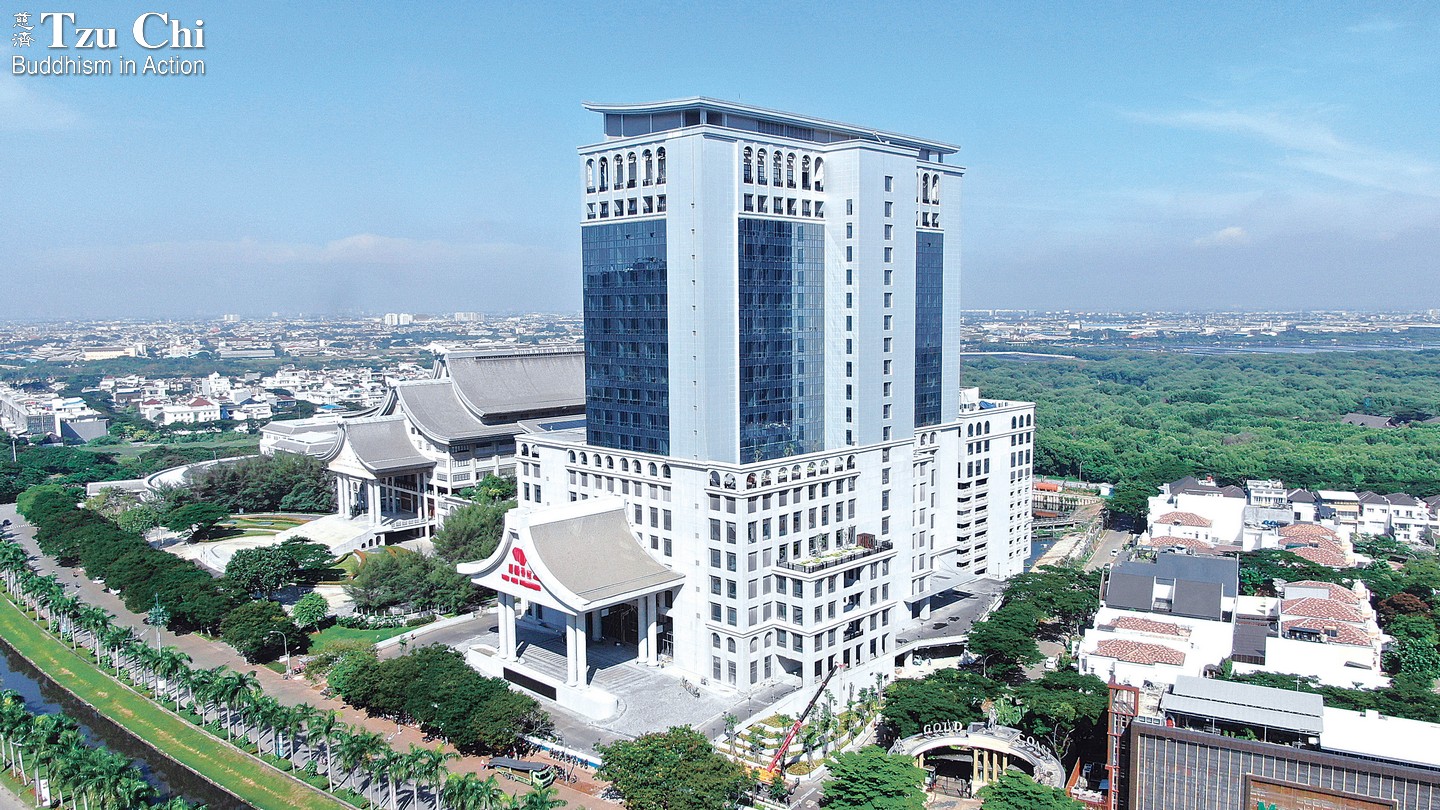
Indonesia Tzu Chi Hospital (right), located next to the Jing Si Hall (left) in the Tzu Chi complex in Jakarta, has opened for a trial operation this year, signifying a big step forward for Tzu Chi Indonesia’s medical mission.
What expectations do you have for Tzu Chi Indonesia?
Tzu Chi Indonesia has been growing very fast. In response, we must continue to recruit volunteers. Volunteers will carry the work of Tzu Chi into the future. We must also enlist more donating members. Doing so will tap into the love in people’s hearts and pool it to do more good. I hope our ranks of volunteers will keep growing and that all volunteers, following in the Master’s footsteps, will continue to work in unity and give selflessly.


